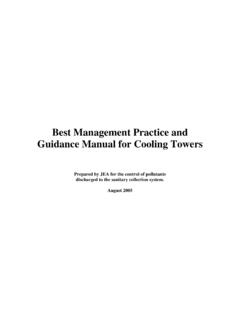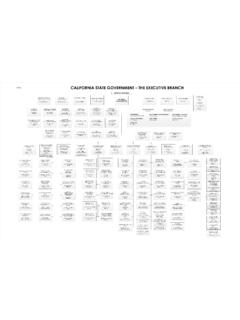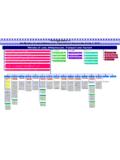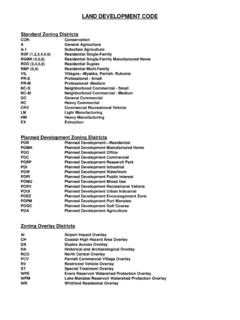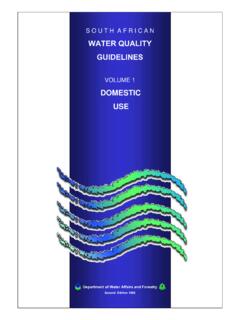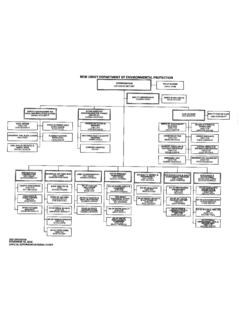Transcription of SOUTH AFRICAN WATER QUALITY GUIDELINES
1 SOUTH AFRICAN WATER QUALITY GUIDELINESV olume 1: Domestic WATER UseSecond Edition, 1996I would like to receive future versions of this document(Please supply the information required below in block letters and mail to the given address)Name:..Organisation:..Address:.. Postal Code:.. Telephone No.:..E-Mail:..Mail reply to:Director: WATER QUALITY ManagementDepartment of WATER affairs & ForestryPrivate Bag X313 PRETORIA0001 SOUTH AFRICAS outh AfricanWater QualityGuidelinesVolume 1 Domestic UseDepartment of WATER affairs and ForestrySecond edition1996 Published byDepartment of WATER affairs and ForestryPrivate Bag X313 PRETORIA0001 Republic of SOUTH AfricaTel: (012) 299-9111 Printed and bound by The Government Printer, PretoriaISBN 0-7988-5338-7 (Set)ISBN 0-7988-5339-5 (Volume 1)Copyright reservedNo part of this publication may bereproduced in any mannerwithout full acknowledgementof the source This report should be cited as: department of WATER affairs and forestry , 1996.
2 SOUTH AFRICAN WATER QualityGuidelines (second edition). Volume 1: Domestic by S Holmes, CSIR Environmental ServicesProduced by:CSIR Environmental ServicesP O Box 395 PRETORIA0001 Republic of SOUTH AfricaThis volume is the first in a series of eight volumes comprising the SOUTH AfricanWater QUALITY GUIDELINES . Volume 1: SOUTH AFRICAN WATER QUALITY GUIDELINES -Domestic WATER UseVolume 2: SOUTH AFRICAN WATER QUALITY GUIDELINES -Recreational WATER UseVolume 3: SOUTH AFRICAN WATER QUALITY GUIDELINES -Industrial WATER UseVolume 4: SOUTH AFRICAN WATER QUALITY GUIDELINES -Agricultural WATER Use: IrrigationVolume 5: SOUTH AFRICAN WATER QUALITY GUIDELINES -Agricultural WATER Use: Livestock WateringVolume 6: SOUTH AFRICAN WATER QUALITY GUIDELINES -Agricultural WATER Use: AquacultureVolume 7: SOUTH AFRICAN WATER QUALITY GUIDELINES -Aquatic EcosystemsVolume 8: SOUTH AFRICAN WATER QUALITY GUIDELINES -Field GuideiiForewordThe department of WATER affairs and forestry is the custodian of SOUTH Africa's WATER resources.
3 Part ofits mission is to ensure that the QUALITY of WATER resources remains fit for recognised WATER uses and that theviability of aquatic ecosystems are maintained and protected. These goals are achieved through complexwater QUALITY management systems which involve role players from several tiers of government, from theprivate sector and from civil society. A common basis from which to derive WATER QUALITY objectives is an essential requirement that enables allrole players involved in such a complex system to act in harmony in order to achieve the overarching goalof maintaining the fitness of WATER for specific uses and to protect the health of aquatic ecosystems. Forthese reasons the department initiated the development of the SOUTH AFRICAN WATER QUALITY GUIDELINES ,of which this is the second edition. The SOUTH AFRICAN WATER QUALITY GUIDELINES serve as the primarysource of information for determining the WATER QUALITY requirements of different WATER uses and for theprotection and maintenance of the health of aquatic process that followed and the wide variety of organizations and individuals involved in the developmentof these GUIDELINES ensured the acceptance and use of these GUIDELINES by all significant role players, as theSouth AFRICAN WATER QUALITY GUIDELINES .
4 These GUIDELINES are technical documents aimed at users witha basic level of expertise concerning WATER QUALITY management. However, the role players involved in thedifferent WATER use sectors are expected to use these GUIDELINES as a basis for developing material to informwater users in specific sectors about WATER QUALITY and to empower them to effectively participate inprocesses aimed at determining and meeting their WATER QUALITY requirements. The department recognises that WATER QUALITY GUIDELINES are not static and will therefore update and modifythe GUIDELINES on a regular basis, as determined by ongoing research and review of local and internationalinformation on the effects of WATER QUALITY on WATER uses and aquatic ecosystems. The process ofdeveloping WATER QUALITY GUIDELINES , and the involvement of key role players, is a contining one. The secondedition is published in a loose leaf, ring binder format to facilitate the regular updating of the GUIDELINES .
5 Allthose who want to comment on and make suggestions concerning the SOUTH AFRICAN WATER QualityGuidelines are invited to do so at any time by contacting the Director: WATER QUALITY Management, department of WATER affairs and forestry , Private Bag X313, Pretoria I wish to express my sincere appreciation to all those who have been involved in the developmentof these GUIDELINES . I also look forward to their continued involvement in maintaining one of the corner-stones of the WATER QUALITY management system in SOUTH Kader Asmal MPMinister Of WATER affairs and ForestryMay 1996 to Guideline of Domestic WATER Contained in the (VI).. Organic Dissolved of of abbreviations / of units of following persons and organisations are thanked for their contributions to these COMMITTEEMs T Belcher, department of WATER affairs and ForestryDr D C Grobler, CSIR Environmental ServicesDr S Holmes, CSIR Environmental ServicesMr J L J van der Westhuizen, department of WATER affairs and ForestryDr H R van Vliet, Institute for WATER QUALITY Studies, department of WATER affairs and ForestryPROJECT TEAMDr F Carlsson, Division of WATER Technology, CSIRDr P L Kempster, Institute for WATER QUALITY Studies, department of WATER affairs and ForestryDr R Kfir, Division of WATER Technology, CSIRTECHNICAL REVIEWERSP rofessor W O K Grabow, department of Medical Virology, University of PretoriaDr C Viljoen, Rand WaterMr I R Morrison, City Council of Cape TownMr W N Richards.
6 Umgeni WaterSTAKEHOLDER DISTRIBUTION LISTD raft copies of the report were circulated to the following people and organisations. All comments receivedfrom stakeholders on this document have been C Albertyn, Environmental Justice Networking ForumMr N Basson, Goldfields WaterBenede Orange Regional Services BoardBo-Karoo Regional Services BoardMr I Berger, Hartebeespoort MunicipalityMs T Bosman, SOUTH AFRICAN National Civics Association City Engineer, Kimberley MunicipalityDr M Colvin, Medical Research CouncilMr Cronje, Pretoria MunicipalityMr A B Davis, Durban City CouncilDiamantveld Regional Services BoardEnvironmental Health Services, Odi Community HospitalMr Fawcett, Cape Town City CouncilMr M J Fenner, Magalies WaterDr R Fig, Group for Environmental MonitoringMr T FowlerDr J Frean, SOUTH AFRICAN Institute for Medical ResearchDr E Friedman, National Programme for Primary Health Care NetworkDr E Heath, SOUTH AFRICAN Tourism BoardviSTAKEHOLDER DISTRIBUTION LIST (CONT.)
7 Dr M Howard, Umgeni WaterDr L Jackson, Environmental Monitoring GroupMs L James, National Union of Mine WorkersKalahari Regional Services BoardDr A K hn, department of WATER affairs and ForestryMr O Langenegger, Otto Langenegger and PartnersDr L Lotter, Johannesburg City CouncilMr M McNerney, SOUTH AFRICAN Bureau of StandardsDr E Meintjies, Rand WaterDr Mitchell, WATER Research CommissionMs L Monageng, Klipgat WATER LaboratoryDr G Munro, Durban City CouncilDr S Nakane, University of the TranskeiNamaqualand Regional Services BoardMr H Neethling, Eastern Services CouncilNorth Cape Regional Services BoardMr I Pearson, Division of WATER Technology, CSIRP D Toens and Partners, Piche, Borehole WATER AssociationDr Potgieter, Bloemfontein MunicipalityThe President, Medical Research CouncilProfessor A Pretorius, University of PretoriaMr D Pretorius, department of HealthDr S Pretorius, Medical Research CouncilMr Proudlock, City of Port ElizabethMr W Richards, Umgeni WaterMr R Rimmer, Johannesburg City CouncilMr J N Rossouw, Division of WATER Technology, CSIRMr K Smal, Phalaborwa WaterMr R Smith, Aventura ResortsMr M C Steynberg, Rand WaterMs N Strauss, Medical Research CouncilMs M Swift, Earth Life AfricaMr W van der Merwe, department of HealthMr D van Rooyen, department of HealthDr J von Schirnding, Transitional Metropolitan CouncilMr G A Willemse, Western Transvaal Regional WATER CompanyMr Winter, SOUTH AFRICAN Bureau of StandardsProfessor W Xhosha, University of the TranskeiChapter 1 IntroductionDomestic WATER Use 2nd Edition, 1996 (1st Issue)Introduction: Page 1 of 51 IntroductionScope and Purpose of the WATER QUALITY GUIDELINES ScopeThe SOUTH AFRICAN WATER QUALITY GUIDELINES for Domestic WATER Use are essentially a userneeds specification of the QUALITY of WATER required for different domestic uses.
8 Thedocument is intended to provide the information required to make judgements as to thefitness of WATER to be used for domestic purposes, primarily for human consumption butalso for bathing and other household uses. The GUIDELINES are applicable to any WATER that is used for domestic purposes, irrespectiveof its source (municipal supply, borehole, river, etc.) or whether or not it has been GUIDELINES do not address:! WATER which is sold as a beverage in bottles;! WATER in swimming pools. PurposeThe SOUTH AFRICAN WATER QUALITY GUIDELINES are used by the department of WATER Affairsand forestry as its primary source of information and decision-support to judge the fitnessof WATER for use and for other WATER QUALITY management SOUTH AFRICAN WATER QUALITY GUIDELINES contain similar information to what isavailable in the international literature. However, the information here is more detailed, andnot only provides information on the ideal WATER QUALITY for WATER uses but in additionprovides background information to help users of the GUIDELINES make informed judgementsabout the fitness of WATER for use.
9 Users of theThe SOUTH AFRICAN WATER QUALITY GUIDELINES are being developed as an importantGuidelinesinformation resource, primarily for WATER QUALITY managers. Nevertheless, educators andother interested and affected members of the general public are likely to find them avaluable source of information for many aspects of WATER QUALITY and its management. OngoingThe SOUTH AFRICAN WATER QUALITY GUIDELINES will be periodically reviewed. The purposeReviewof the reviews is to:!Add GUIDELINES for constituents not yet included;!Update the GUIDELINES for constituents currently included, as relevant new informationfrom international and local sources becomes available on the WATER QUALITY or supportinformation for a particular loose leaf / ring binder format of the GUIDELINES , as well as the footnotes at the bottomof each page, which clearly indicate the exact version of the guideline, have been designedto facilitate regular SOUTH AFRICAN WATER QUALITY GUIDELINES for Domestic WATER Use is divided into sixchapters:!
10 Chapters 1 - 4 provide an introduction to the GUIDELINES , define some important waterquality concepts, explain how domestic WATER use was characterised for the purpose ofDomestic WATER Use 2nd Edition, 1996 (1st Issue)Introduction: Page 2 of 52developing these GUIDELINES , describe how the GUIDELINES were developed and providesome guidance on how they should be used.!Chapter 5 provides the actual GUIDELINES for the different WATER QUALITY constituents.!Chapter 6 consists of appendices which provide additional support information to usersof the QualityIntroductionTo apply the SOUTH AFRICAN WATER QUALITY GUIDELINES correctly it is important for users tounderstand how WATER QUALITY and some related concepts were defined for the purpose ofdeveloping the GUIDELINES . Definition The term WATER QUALITY describes the physical, chemical, biological and aesthetic propertiesof WATER which determine its fitness for a variety of uses and for protecting the health andintegrity of aquatic ecosystems.
